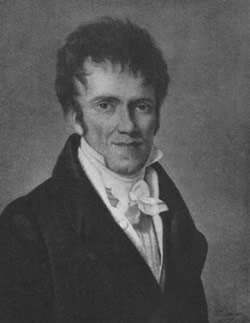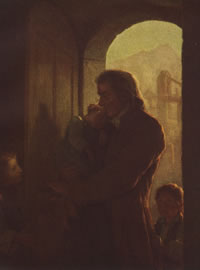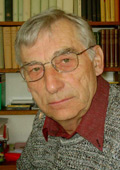Stans and the letter from Stans
1798-1799
In early days Stans generated the myth of "Pestalozzi". The well known oil paintings by Grob (1879) and Anker (1870) in particular clearly portrayed Pestalozzi as the father of the orphans surrounded by children and illuminated by warm sunlight. But the reality of Pestalozzi's short months in Stans was different.
In March 1798 the Swiss Confederation finally broke down after the invasion of the French troops. Now more than ever Pestalozzi‘s hopes to develop education for the people by order of the new state grew even more. He moved forward quickly and by May he had already submitted a letter to the government which offered " the essential improvement of education and schools for ordinary people" (PSB 4, pg. 15). The board of directors – the executive of the "Helvetic Republic" consisting of five men granted Pestalozzi a reasonable amount of money to set up an institute. However the opening was delayed as a suitable place could not be found and tensions increased in the following months.
France changed the Swiss Confederation – a loose connection of small and some independent states – into a centralized state with borders that were partly drawn arbitrarily. The population of each Canton had to swear to obey the new constitution. The inhabitants of the Catholic part of Switzerland opposed this oath as they feared the free expression of their ancestral Roman Catholic belief would be endangered by the new system. The Helvetic government threatened to move in French troops and all gave in except the small Canton Nidwalden. The French, in an attempt to break the resistance of this Canton, occupied the country, stole, plundered and set fire to the villages including Stans itself.
As publisher of the semi-official "Helvetic People's Newspaper" Pestalozzi had publicly approved of the marching in of the French troops, as he thought the unity of the state would be in danger. He had not of course, expected bloodshed and senseless destruction, but believed that the presence of the troops would make the inhabitants surrender to the higher interests of the country. Maybe he believed it was a type of compensation as the government decided to open an institution for the orphans in Stans and to make him the head of this house. However, this was going to be an extraordinarily difficult task, as the population knew him as a supporter of the Helvetic Republic and as a member of the Reformed Church and showed a hostile attitude towards him. He therefore felt he could only count on the support of the catholic pastor Businger, who worked in Stans and who was inwardly on the side of the innovators.
The institution was opened on January 14th 1799 and after six weeks there were already more than 80 children who were looked after by Pestalozzi and a maid. He devoted himself entirely and after years of pent up energy he threw himself into educating the children. Now he was determined to put the pedagogical ideas he developed during the last 20 years into practise. He wrote with enthusiasm to his wife Anna, who was staying with the countess Franziska Romana von Hallwil at the castle of Hallwil:
"The question of what is to be the fate of you and me can no longer be in doubt now. I am putting into action one of the greatest ideas of all time. If you have a husband who has not been misjudged, but who is worth the contempt and disparagement he is faced with, there is no hope for him; but if I have been misjudged and worth what I myself believe in you can soon expect help and advise from me." (PSB 4, pg. 18).
During his time at Stans he did not want to simply work from preconceived ideas, but to encourage learning from the experiences of life. The center of Pestalozzi‘s efforts were to help the children deal with the demands of everyday life in the scope of a concrete community. He believed these "moral powers" could be developed in three steps. The foundations were laid by acquiring a "moral state of mind" in the course of satisfying primary needs. Basing on this sentiment good behaviour should be practised to a point where it becomes habit for the children. Only in the third step does he let them talk about morality in order to further develop rational ideas of their own internal morality. One can clearly see in these three phases, Pestalozzi's effort to connect feeling (heart), acting (hand) and thinking (head) as well as the intention to develop ethic behaviour in an emotional capacity rather than on rational insight which would have been the way during the Age of Enlightenment. The organization of everyday school life however was very dissimilar from today's ideas and practises. Actual lessons took place in the mornings between six and eight o'clock and between four and eight o'clock in the evenings, the remaining time being filled with home work and craft. Pestalozzi could only partly action his idea of connecting practical work with the acquisition of basic knowledge as he did not have enough time for the organization of such a demanding project.
Due to the armed conflict in Switzerland, the rooms in the former convent in Stans where Pestalozzi's institution was accommodated, were to be made available to the troops as a military hospital. The concept of an ‘institution for the poor’ was a thorn in the side for Heinrich Zschokke, the current government commissioner of Lucerne, Zschokke Anmerkung was unable to use Pestalozzi's activity as propaganda for the new government as criticism of this work was too general. The need of a military hospital was therefore a suitable way to end Pestalozzi's work in Stans. Most of the children who lived at Stans were taken- in by their relatives. Only 22 remained in the care of the already mentioned pastor Businger, who had already dissociated himself from Pestalozzi. The latter left Stans on June 9th in 1799. He was physically overworked and suffered emotionally from the sudden interruption of his attempt of practical pedagogical activity, which had begun so hopefully. He therefore accepted the offer to spend some weeks in the Gurnigelbad in the Berner Oberland in order to recover. He spent the majority of his time there writing down his experiences and thoughts in his "Brief an einen Freund über meinen Aufenthalt in Stans" ("Letter to a friend about my time in Stans").

The "letter from Stans" is considered to be one of the most important of Pestalozzi’s academic works and was printed, interpreted and quoted in the pedagogical literature Anmerkung time and time again. The letter from Stans was not left in its original form. It could have been addressed to the bookseller Heinrich Gessner from Zurich, who also had been the addressee of the 14 letters "Wie Gertrud ihre Kinder lehrt" ("How Gertrud teaches her children"). It also could have been addressed to the secretary of the Helvetic minister Stapfer, J. R. Fischer, who had a pedagogical interest in his work and who organised Pestalozzi to stay in the Gurnigelbad with Zehender, the host of the Gurnigelbad. The letter from Stans was only published in 1807 together with annotations by Niederer in the first volume of the `Wochenzeitschrift für Menschenbildung" ("Weekly Newspaper for the Education of the People"). By this time Pestalozzi already had his work in Burgdorf behind him and had become famous in Europe as the head of his educational institute in Yverdon. In the ninth volume of the Cotta-edition of 1822 the letter was published without Niederers annotations. The account in the critical edition of Pestalozzi's works (PSW 13, pg. 1-32) follows this edition.
The text passages quoted from the "Letter from Stans" mainly examine the following:
The discussion of the problems in the beginning: the situation of the children and the reservations about Pestalozzi as an advocate of the Helvetic Republic and as a member of the Reformed Church in a catholic place.
"Besides basic monetary needs, everything was lacking and the children crowded in the kitchen whilst enough rooms or beds could be prepared for them. At the beginning is was all terribly confusing. For the first weeks I was in a room that was barely the size of 24 square foot. The atmosphere was unhealthy, bad weather played its part and the dust -covered walls that lined all corridors made the beginning even more uncomfortable.
At the start I had to send some of the poor children home for the night because of the lack of beds. These would return riddled with infection the following mornings. Most of these children were in such a state, a consequence of the utmost affront of mankind. Many came home with ingrained scabies, so they could hardly walk, many with badly injured heads, many with an illness called "Hudeln", loaded with disease, many gaunt and haggarded like skeletons. Yellow, grinning, with eyes full of fear and foreheads full of wrinkles, hypocrisy and all kinds of falseness; others overwhelmed with misery, enduring but mistrusting, loveless and timorous. Among them were some spoilt ones who grouped together and who were used to living in a leisurely manner and were full of demands and despised the children of beggars and the poor. They were unhappy with this new equality as it did not correspond with their former, ‘better’ way of life and thus did not meet their wishes. Everywhere was sluggish inactivity, minds ill-practised lacking essential physical skills. Out of ten children hardly one knew the alphabet. Other school lessons or basic educational methods for improving the mind were barely heard of. […]
By fire and sword the tormented country had suffered all the horrors of war. Most people detested the new constitution. They were resentful of the government and were even sceptical of its help. Because of their melancholic characters they refused to accept change, they clung to their old existence, as miserable as it was, with a bitter and suspicious stubbornness. I was among them as a creature of the new -hated system. The opportunity of reform was is in the hands of the people whom had become creatures of habit and used to their own misfortune, but on the other hand, they themselves thwarted any change as all their views, hopes and dreams could never be realised.
This political discord worsened with an equally as strong religious discord. I was considered to be a heretic who, for all the good he did to the children, still endangered their salvation. These people had never before seen a member of the Reformed Church holding a public post, not to mention as educator and teacher of their children, living among them and organising activities. The time promoted both religious and political distrust; apprehension despondency and deceit, and since Stans existed, became more than ever the order of the day." (PSW 13, pg. 5 and pg. 8-9).
The text passage about the connection of public and home education was very much influenced by Pesalozzi’s development of public education..
"My convictions agreed with my aim. I wanted to try to prove that the advantages of home education yield the same results as public education and that the latter has a value for mankind only by imitating the former. Lessons, that do not utilise the entire mind, which is a the requirement of mankind’s education, and that are not based on the domestics of life, in my opinion will not get us any farther than artificially shrinking our race. Every good type of education demands that every day and every hour the mother’s eye should read every change in the emotional state of her child in its eye, on its mouth and its forehead. The essential point is that the power of the educator is pure, developed in such domestic conditions which are generally equal to the power of a father. I relied on this. That my heart clings to my children, that their happiness would be my happiness, their joy my joy, this my children should see on my forehead and discover on my lips from early morning till late evening of every moment." (PSW 13, pg. 7-8).
The three steps of moral education: "all-round supply" and development of confidence, moral behaviour (e.g. the children from Altdorf) and lastly, the reflection and demonstration of moral behaviour.
"However depressing and helpless I felt, it was favourable to the centre of my aims. It forced me to be everything to my children. From morning till evening I was alone in their midst. Everything good that happened to their heart and soul came from my hand. Every aid, every helping hand in trouble, every teaching they received came directly from me. My hand lay in their hand, my eye rested on their eye.
My tears flowed with theirs and my smile accompanied theirs. They were not in their own world, they were not in Stans, they were with me and I was with them. Their soup was mine, their drink was mine. I had nothing, I had no housekeeping, no friends, no services around me, I had only them. They were healthy - I was in their midst, they were ill - I was at their side, I slept in their midst. In the evening I was the last to go to bed, in the morning the first to get up. I prayed with them and even taught them in bed until they fell asleep, they wanted it like that. I fought against the almost invincible uncleanliness of their clothes and their persons and every moment I was exposed to the dangers of infection. Because of this the children little by little became closer to me and to some extent befriended me thereby contradicting the foolish and contemptuous words they heard against me even from their parents and friends. I believe they loved me twice as much because they felt I had been wronged. But what does it matter if the little chicks in their nest love their mother if the bird of prey, that threatens them all with death, floats daily with all his power above their nest?! […]
When Altdorf Anmerkung burnt down I gathered them all around me and said to them: "Altdorf has burnt down. At this moment there are perhaps a hundred children without shelter, without food and without clothes. Do you want to ask our good government to admit about 20 of these children to our house?" I still can see the emotion before my eyes, accompanied with "oh yes, oh my god yes". "But children", I warned them, think first about what you demand. Our house does not have as much money as it wants, nor is it certain that we will receive more than before if we take in poor children. The situation may ask you to work more for your lessons to get less to eat and even to share your clothes with these children. Therefore don't say you want these children if you are not ready to gladly and sincerely put up with all of this because of their misery." I said this with all the power I had, I let them repeat what I had said to be sure they had really understood where their plead would lead to. But they stayed firm and repeated: "Yes, yes, even if we get less to eat and have to work more and to share our clothes with them, we will still be happy if they come. […]
The whole moral elementary education is based on three viewpoints: Obtaining a moral state because of pure emotions, moral behaviours by overcoming oneself and practising in what is right and good, and finally a moral view which arises by thinking and comparing the legal and moral situation in which the child lives in context of its existence and surroundings." (PSW 13, pg. 9-10, pg. 16 and pg. 19).
And elsewhere it is written:
"The human being so much desires the good, the child gladly has an ear for it; but it does not want it for you, the teacher, it does not want it for you, the educator, it wants it for itself. The good that should be led does not need to be an insight into your mood or your passion, it has to be good by nature and it has to catch the eye of the child as good. They need to feel the necessity of your will before they want the same. Everything that cherishes it, they want. Everything that makes it honourable, they want. Everything that awakens great expectations in it, they want. Everything that raises powers in it, which makes it say "I can", they want. But this kind of will is not a result of words, but of the ‘all-round supply’ of the child and of the emotions and powers that are awakened inside the child by the all-round supply. The words do not create such moral awareness, only a clear insight and the awareness of it." (PSW 13, pg. 8).
Pestalozzi's statements about the lessons: the connection of lessons and industrial work, the system of children’s help among one another and elementary first lessons to make it possible for the mothers to initiate it themselves.
"I actually considered learning with regard to the words they had to learn and even the theories which they described, to be quite unimportant. My actual aim was to connect learning with working, and to merge the educational with the industrial institutions. But I could not attain these aims especially as I was not prepared in regard to the staff nor the work nor the necessary machines. Only a short time before the closure some of the children had begun with spinning, some hadn’t, And so I realised that such a merge was out of the question. The previous elementary education of learning and working was not formulated in a purely separated and independent manner and the special types and needs of each of these subjects were made plain. […]
The number and differences between the children made my work easier. Under the mother's watch, the older and more capable brother can substitute his mother’s role by demonstrating everything he knows in front of his younger brother and feels glad and grown up. Similarly, my children were happy to teach others what they could. Their sense of honour was awakened and they themselves also learned by having others say over again what they repeated. Thus I soon had helpers and assistants among my children. During the first days I made them spell by heart some very difficult words and as soon as one knew the word they gathered around and taught it to the one who could not yet spell it. Thus from the beginning on I formed my own helpers. Shortly I had assistants among my children who, after living in the institution, developed their own skills of teaching the weaker pupils and who, without a doubt, would have become more useful in many ways to meet the current needs of the institution than the employed teachers. […]
It was my aim to simplify all teaching aids to such an extent that every common human being could easily be made to teach his children and to make elementary schools almost superfluous. Like the mother is the first physical feeder of her child she, by the will of god, shall also be its first mental feeder. I consider the evils very important that were caused by going to school prematurely and by everything that is taught to the children in order to educate them outside the living room. The time is coming, when we must simplify the teaching aids, that every mother without outside help will be able to teach not only her child but she herself can continue learning. My experience of this confirms my theory especially seeing children growing up around me who followed my footsteps. I am convinced more than ever that as soon as the educational establishments with power and psychology are connected with working establishments, a race will develop that learns by experience that what they could have learned in the home would have taken a tenth of the time and energy that is devoted to such institutions. Education should be given in such a way to correspond with the needs of the home so everywhere common parents can try it themselves, which will become easier and easier by the simplifying of the teaching methods and by the increasing number of perfectly trained people." (PSW 13, pg. 26, pg. 29 and pg. 30).



